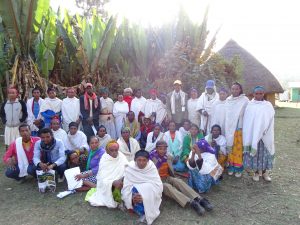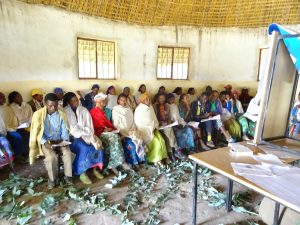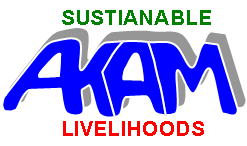Empowerment of women through strong livelihood, collective action & advocacy
Rationale
The project is implemented in four rural communities in the Dendi and Ambo districts of the West Shewa Zone of Oromia, Ethiopia. The area is highly disadvantaged and marginalised due to poor road and market infrastructure, absence of electricity and potable water supply, weak education and health services, and inadequate extension and advisory services. The people’s livelihood is based on mixed highland crop and livestock farming characterised by small farm size, declining yields of crops and livestock, subsistence-oriented production, and increasing vulnerability to the impacts of climate change and other agricultural risks because of poverty, marginalisation and degradation of natural resources. A wealth ranking undertaken in 2019 revealed that more than 75% of the families were ranked as poor or very poor based on their asset endowments like cultivated land size, oxen, sheep, number of enset, eucalyptus plantation, and family size. Women farmers’ access to and participation in extension services are limited, it is much lower for married women. Culturally women face constraints in operating and going far outside the home, have low literacy, and have heavy domestic responsibilities. The public extension and advisory services are not delivered in a way that women’s needs and situations are addressed.
Objective
The goal of the project is to empower 480 women farmers to have increased farm production, consumption of nutritious foods, income, and resilience to climate and agricultural risks while conserving natural resources and strengthening women collective actions and agency. In nutshell, the poor and vulnerable women farmers will be supported to become self-reliant; increase production of diverse and nutrition-dense foods; conserve natural resources; improve processing, storage and marketing of surplus produce; change nutrition behaviours; generate income from different sources; and improve gender roles, household relations (workload and decision making); and participation and leadership of community development.

Progress to date
The following activities are commenced:
- Initiate establishment of 24 WEGs’ saving and credit schemes.
- Support WEGs in implementation of community actions with tools.
- Recruit, train and coach eight community facilitators.
- Raise awareness of 40 influential people at community-level about gender equality and positive role of women in the community.
- Provide start-up seeds and seedlings for nutritious crops, vegetables and agroforestry.
- Skill training for 480 women farmers organised in 24 Women Economic Groups.


